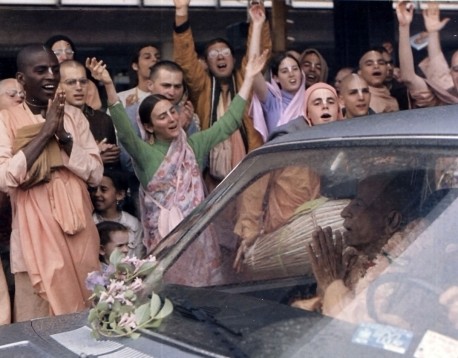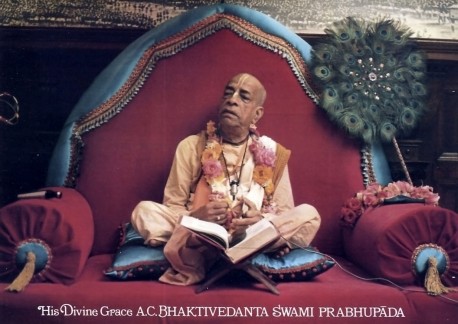An Excerpt from Srila Rupa Gosvami’s Upadesamrta.
[SRILA RUPA GOSVAMI was one of six exalted devotees especially chosen through the Krishna conscious chain of spiritual masters to teach the devotional service of the Supreme Lord in a scientific manner. Although all of these six great devotees were erudite scholars and prolific writers, Srila Rupa Gosvami is the most prominent, for he most greatly appreciated the nectar of Krishna consciousness. His Upadesamrta (Nectarean Instructions), a short work of only eleven verses, teaches the basic principles for arousing one’s dormant love of Krishna, the Supreme Lord. Written in Sanskrit some 400 years ago, it has now been translated into English, with an illuminating explanation of each verse, by His Divine Grace A.C. Bhaktivedanta Swami Prabhupada.]
atyaharah prayasas ca/ prajalpo niyamagrahah
jana-sangas ca laulyam ca/ sadbhir bhaktir vinasyati
atyaharah-overeating; prayasah-too much endeavor; ca-and; prajalpah-idle talk; niyama-for rules and regulations; agrahah-too much attachment (or agrahah-too much neglect); jana-sangah-bad association; ca-and; laulyam- ardent longing or greed; ca-and; sadbhih-by these six; bhaktih-devotional service; vinasyati-is destroyed.
TRANSLATION
Becoming too entangled in these six kinds of activities spoils the development of one’s devotional service: (1) eating more than necessary or collecting more than necessary or collecting more funds than required; (2) over-endeavoring for mundane things that are very difficult to attain; (3) talking unnecessarily about mundane subject matters; (4) practicing the scriptural rules and regulations only for the sake of following them, with no resultant benefits of spiritual advancement, or rejecting the rules and regulations of the scriptures and working independently or whimsically; (5) associating with worldly-minded persons who are not interested in Krishna consciousness; and (6) being greedy for mundane achievements.
PURPORT
Human life is meant for plain living and high thinking. This material world is designed so that one is obliged to work, for all conditioned living beings are under the control of the Lord’s third energy. The Supreme Personality of Godhead has three primary energies or potencies. The first is called antaranga-sakti, or the internal potency, the second is called tatastha-sakti, or the marginal potency, and the third is called bahiranga-sakti, or the external potency. The living entities constitute the marginal potency, and they are situated between the internal and external potencies. Being subordinate as eternal servants of the Supreme Personality of Godhead, the jivatmas, or atomic living entities, must remain under the control of either the internal or external potency. When they are under the control of the internal potency they display their natural, constitutional activity, namely, constant engagement in the devotional service of the Lord. This is stated in Bhagavad-gita, Chapter Nine, verse 13:
mahatmanas tu mam partha
daivim prakrtim asritah
bhajanty ananya-manaso
jnatva bhutadim avyayam
“O son of Prtha, those who are not deluded, the great souls, are under the protection of the divine nature. They are fully engaged in devotional service because they know Me as the Supreme Personality of Godhead, original and inexhaustible.”
Mahatma refers to persons who are broad-minded, not cripple-minded. Cripple-minded persons, always engaged to satisfy their senses, sometimes expand their activities for doing good to others through some “ism” like nationalism, humanitarianism or altruism. They think that personal sense gratification is not good but the sense gratification of other persons like the members of their family, community and society, either national or international, is very nice. All this extended sense gratification, from personal to communal and social, may be very good from the material point of view, but such activities have no spiritual value. The quality of such activity is sense gratification, whether personal or extended. Only when one gratifies the senses of the Supreme Lord can he be called a mahatma, or broad-minded person.
In the above verse from Bhagavad-gita, daivim prakrtim refers to the control of the internal potency, or pleasure potency, of the Supreme Personality of Godhead, which is manifest as Srimati Radharani or Her expansion Laksmi, the goddess of fortune. When the individual jiva souls are under the control of the internal energy then-only engagement is to satisfy Krishna, or Visnu. This is the position of a mahatma. Otherwise one is not a mahatma but a duratma, or cripple-minded person. Such mentally crippled duratmas are put under the control of the Lord’s external potency, mahamaya.
All the living entities within this material world are under the control of mahamaya, whose business is to subject them to the influence of threefold miseries: adhidaivika-klesa (sufferings caused by the demigods, such as droughts, earthquakes and storms), adhibhautika-klesa (sufferings caused by other living entities like insects or enemies), and adhyatmika-klesa (sufferings caused by one’s own body and mind, such as mental and physical infirmities). Daiva-bhutatma-hetavah: the conditioned souls, subjected to these three miseries by the control of the external energy, suffer various difficulties, which are called adhayo vyadhayah klesah.
The problem confronting the conditioned souls is the repetition of birth, death, old age and disease. In the material world one has to work for the maintenance of the body and soul. But how can one perform such work in a way favorable for the execution of Krishna consciousness? Everyone requires possessions such as food grains, clothing, money and other things necessary for maintenance of the body, but one should not collect more than his actual basic needs. If we follow this natural principle there will be no difficulty in maintaining body and soul together.
By the arrangement of nature, living entities lower on the evolutionary scale than human beings do not eat or collect more than necessary. As such, there is generally no economic problem or scarcity of necessities in the animal kingdom. If a bag of rice is kept in a public place, the birds will come, eat a few grains and go away, but a human being will take more rice from the bag than he requires. He will try to collect more and keep it in store. This atyahara, overeating or collecting more than necessary, is prohibited, for the entire world suffers because of it.

Collecting and eating more than necessary also causes prayasa, or unnecessary endeavor. By God’s arrangement anyone in any part of the world can live very peacefully if he has some land and a milk cow. There is no need for a man to move from one place to another to earn a livelihood, for one can produce food grains locally and get milk from cows. That will solve all economic problems. Fortunately, man has been given higher intelligence for the cultivation of Krishna consciousness, or understanding of God, one’s relationship with Him, and the ultimate goal of life, love of God. But unfortunately, so-called civilized man, not performing such activities, desires to get more than necessary and eat simply to satisfy the tongue.
By God’s arrangement there is sufficient scope for producing milk and grains for the human beings all over the world. But instead of using his higher intelligence for cultivating God consciousness, the so-called intelligent man misuses his intelligence to produce many unnecessary things, and for this purpose he opens factories, slaughterhouses, brothels, liquor shops, etc. if people are advised not to collect or eat too much or work unnecessarily to possess artificial amenities, they think that such advice is meant to take them back to a primitive way of life because they do not like to accept plain living and high thinking. That is their unfortunate position.
Human life is meant for realization of God, and the human being has been given higher intelligence for this purpose. Those who would use this higher intelligence to attain a higher state should follow the instructions of the Vedic literatures, for taking instructions about the advancement of human civilization from higher authorities actually situated in perfect knowledge gives real meaning to human life.
In Srimad-Bhagavatam, First Canto, Second Chapter, ninth verse, Sri Suta Gosvami describes the dharma (occupation) meant for cultivation by human beings:
dharmasya hy apavargyasya
nartho ‘rthayopakalpate
narthasya dharmaikantasya
kamo labhaya hi smrtih
“All occupational engagements [dharma] are certainly meant for ultimate liberation. They should never be performed for material gain. Furthermore, one who is engaged in the ultimate occupational service [dharma] should never use material gain to cultivate sense gratification.”
 Dharma, religion, the first step in human civilization, consists of occupational engagements performed according to the scriptural injunctions. The higher intelligence of a human being should be trained to understanding this basic dharma. In human society as a whole there are various concepts of religion, designated as Hindu, Christian, Hebrew, Mohammedan, Buddhist, etc., for without religion human society is no better than animal society.
Dharma, religion, the first step in human civilization, consists of occupational engagements performed according to the scriptural injunctions. The higher intelligence of a human being should be trained to understanding this basic dharma. In human society as a whole there are various concepts of religion, designated as Hindu, Christian, Hebrew, Mohammedan, Buddhist, etc., for without religion human society is no better than animal society.
As stated above, dharmasya hy apavargyasya nartho ‘rthayopakalpate: religion is meant for attaining emancipation, not for getting bread. Sometimes human society manufactures a system of so-called religion aimed at material advancement, but that is far from the purpose of true dharma. Religion entails understanding the laws of God because the proper execution of these laws ultimately leads one out of material entanglement. That is the true purpose of religion. But generally people accept religion only for material prosperity because of atyahara, or an excessive desire for material prosperity.
True religion instructs people to be satisfied with the bare necessities of life while cultivating spiritual consciousness. Even though we require economic development, it is required only for supplying the bare necessities of material existence. Jivasya tattva-jijnasa: the real purpose of life is to inquire about the Absolute Truth. Our prayasa, or endeavor, should be to inquire about the Absolute Truth, otherwise we will simply increase our endeavor to satisfy our artificial needs. A spiritual aspirant should avoid this kind of mundane endeavor.
Another impediment is prajalpa, unnecessary talking. Generally when we mix with a few friends we immediately begin unnecessary talking, just like croaking toads. If we must talk we should talk about the Krishna consciousness movement. Persons outside of the Krishna consciousness movement are interested in reading heaps of newspapers, magazines and novels, solving crossword puzzles and doing many other nonsensical things. In this fashion they simply waste their valuable time and energy. In the Western countries we have seen old men retired from active life who engage in playing cards, fishing, watching television and debating about useless socio-political schemes. All these and similar frivolous activities are included in the category of prajalpa. Intelligent persons interested in Krishna consciousness should never take part in such activities.
Jana-sanga refers to associating with persons not interested in Krishna consciousness. One should strictly avoid such association. Srila Narottama dasa Thakura has therefore advised us to live only in the association of Krishna conscious devotees (bhakta-sane vasa). One should always engage in the service of the Lord in the association of the Lord’s devotees.
Association with persons engaged in a similar line of business is very much conducive to advancement in that line. Consequently materialistic persons form associations and clubs to enhance their various types of business. For example, in the business world we find such institutions as the stock exchange and chamber of commerce. We have therefore opened the International Society for Krishna Consciousness to give the opportunity for spiritual association to persons who have forgotten Krishna. This spiritual association offered by our ISKCON movement is increasing day by day. Many people from different parts of the world are joining this Society to awaken their dormant Krishna consciousness.

Srila Bhaktisiddhanta Sarasvati Thakura writes in his Anuvrtti commentary that for mental speculators or dry philosophers too much endeavor to acquire knowledge also comes within the category of atyahara (collecting more than needed). According to Srimad-Bhagavatam, the endeavor of philosophical speculators to write volumes of books on dry philosophy devoid of Krishna consciousness is entirely futile. Karmis who write volumes of books on economic development also fall within the category of atyahara. People who have no desire for Krishna consciousness and are simply interested in possessing more and more material assets, either in the shape of scientific knowledge or monetary gain, are all included under the heading of atyahara.
Karmis labor to accumulate more and more money for future generations, without knowledge of their own future position. Only interested in getting more and more money for their sons and grandsons, such foolish persons do not even know what their position is going to be in the next life. There are many incidents that illustrate this point. Once a big karmi accumulated a vast fortune for his sons and grandsons. Later, according to his karma, he took his birth in a cobbler’s house located nearby the same palatial building he had previously constructed for them. It so happened that this very cobbler came to his former house, and his former sons and grandsons beat him with shoes. Therefore, unless such karmis and jnanis become interested in Krishna consciousness they are simply wasting their time in fruitless activities.
Accepting some of the scriptural rules and regulations for immediate benefit, as utilitarians advocate, is called niyama-agraha, and neglecting the rules and regulations of the sastras meant for spiritual development is called niyama-agraha. Rgraha means “eagerness to accept,” and agraha means “failure to accept.” By the addition of either of these two words to niyama (“rules and regulations”) the word niyamagraha is formed. Thus niyamagraha has a two-fold meaning that is understood according to the particular combination of the words. Persons interested in Krishna consciousness should not be eager to accept the rules and regulations meant for economic advancement, but, on the other hand, they should very faithfully accept scriptural rules and regulations for the advancement of Krishna consciousness. They should strictly follow the regulative principles like no illicit sex, no eating of meat, fish or eggs, no gambling and no habits of intoxication.
One should avoid association with Mayavadis, persons who blaspheme Vaisnavas (devotees). Bhukti-kamis interested in material happiness, mukti-kamis desiring liberation by merging in the existence of the formless Absolute (Brahman), and siddhi-kamis desiring the perfection of mystic yoga practice are classified as atyaharas. To associate with such persons is not at all desirable.
Desires to expand the mind by perfection of mystic yoga, to merge in the existence of Brahman, or to achieve whimsical material prosperity are all included within the category of greed, or laulya. All attempts to acquire such material benefits or so-called spiritual advancements are impediments on the path of Krishna consciousness.
The modern warfare between the capitalists and communists is due to their avoiding the advice of Srila Rupa Gosvami regarding atyahara. The modern capitalists accumulate more wealth than necessary, and the communists, envious of them, want to nationalize all wealth and property. The communists, however, also do not know how to solve the problem of wealth and its distribution. Therefore when the wealth of the capitalists comes into the hands of the communists, that is not the solution to the problem.
According to the Krishna conscious ideology, all wealth belongs to Krishna. Therefore unless wealth comes under the administration of Krishna there can be no solution to the economic problem, neither by wealth’s being in the hands of the communists nor by its being in the hands of capitalists. There is a nice example in this connection. If a one-hundred-dollar note is lying in the street, someone may pick up the note and put it in his pocket. Such a man is not honest. Another man may see the note and decide to let it remain there, thinking he should not touch another’s property. Although this second man does not steal the note for his own purposes, he is unaware of the proper use of the note. But when a third man sees such a note, he may pick it up, find the man who lost it and deliver it to him. This third man does not take the note for his own expenditure nor neglect the note lying in the street. He takes it and delivers it to the man who lost it. This man is therefore both honest and wise.
Simply transferring wealth from capitalists to communists cannot solve the problems of modern politics because it has been practically seen that when a communist gets money he utilizes it for his own sense gratification also. The wealth of the world actually belongs to Krishna. Every living entity, man or animal, has the birthright to use God’s property for his maintenance. When he takes more than his maintenance requires, whether he is a capitalist or communist, he is a thief, and as such he is liable to be punished by the laws of nature. The wealth of the world should be utilized for the welfare of all living entities, for that is the plan of mother nature.
Everyone has the right to live by utilizing the wealth of the Lord. When people learn this art of scientifically utilizing the Lord’s property and no longer encroach upon others’ rights, they can form an ideal society. This basic principle of a spiritual society is stated in the first mantra of Sri Isopanisad, the primer of spiritual culture, as follows:
isavasyam idam sarvam
yat kinca jagatyam jagat
tena tyaktena bhunjitha
ma grdhah kasya svid dhanam
“Everything animate or inanimate that is within the universe is controlled and owned by the Lord. One should therefore accept only those things necessary for himself, which are set aside as his quota, and one must not accept other things, knowing well to whom they belong.”
Krishna conscious devotees know very well that this material world is designed by the complete arrangement of the Lord to fulfill all the necessities of life for all living beings without their having to encroach upon the life or rights of one another. This complete arrangement affords the proper quota of wealth for everyone according to his real need, and thus everyone may live peacefully according to the principle of plain living and high thinking. On the other hand, materialistic persons who have no faith in the plan of God nor any aspiration for higher spiritual development misuse their God-given intelligence only for the augmentation of their material possessions. They devise many systems such as capitalism and materialistic communism to advance their material position without reference to the laws of God or a higher goal of life. Always anxious to fulfill their unlimited desires for sense gratification, they are conspicuous by their ability to exploit their fellow living beings.
When human society gives up these elementary faults of character enumerated by Srila Rupa Gosvami (atyahara, laulya, etc.) all enmity will will cease between men and animals, capitalists and communists, as will all problems of economic or political maladjustment and instability. This pure consciousness is awakened by the proper spiritual education and practice offered scientifically by the Krishna consciousness movement.
The Krishna consciousness movement is a spiritual community that can bring about a peaceful condition in the world. Every intelligent man should purify his consciousness of the above-mentioned six hindrances to devotional service by taking wholehearted shelter of this Krishna consciousness movement.


Leave a Reply